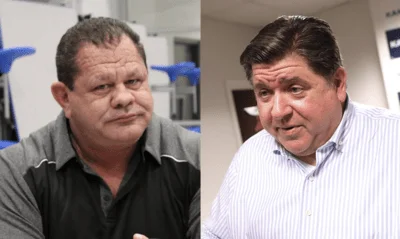State Senator Mary Edly-Allen | Illinois General Assembly
State Senator Mary Edly-Allen | Illinois General Assembly
According to the Illinois General Assembly site, the legislature summarized the bill's official text as follows: "Amends the Lobbyist Registration Act. Directs the Secretary of State to grant a waiver of the lobbyist registration fee for any not-for-profit entity with total expenses of less than $1,000,000 in the most recent fiscal year that is classified as tax-exempt under Section 501(c)(3) of the Internal Revenue Code, including a waiver for any lobbyist that exclusively lobbies on behalf of such an entity."
The following is our breakdown, based on the actual bill text, and may include interpretation to clarify its provisions.
In essence, this bill amends the Lobbyist Registration Act to require the Secretary of State to provide a waiver for the lobbyist registration fee for any not-for-profit entity with total expenses under $1 million in the most recent fiscal year, given that the entity is recognized as tax-exempt under Section 501(c)(3) of the Internal Revenue Code. Additionally, it mandates a similar fee waiver for any lobbyist who solely represents such organizations. The bill emphasizes annual registration requirements, the need for a submitted photo, and specifies the allocation of registration fees to the Lobbyist Registration Administration Fund for enforcement and administration purposes.
Mary Edly-Allen has proposed another three bills since the beginning of the 104th session.
Edly-Allen graduated from Northeastern Illinois University in 1993 with a BA.
Mary Edly-Allen is currently serving in the Illinois State Senate, representing the state's 31st Senate District. She replaced previous state senator Terry Hall in 2023.
Bills in Illinois follow a multi-step legislative process, beginning with introduction in either the House or Senate, followed by committee review, floor debates, and votes in both chambers before reaching the governor for approval or veto. The General Assembly operates on a biennial schedule, and while typically thousands of bills are introduced each session, only a fraction successfully pass through the process to become law.
You can read more about bills and other measures here.
| Bill Number | Date Introduced | Short Description |
|---|---|---|
| SB1196 | 01/24/2025 | Amends the Lobbyist Registration Act. Directs the Secretary of State to grant a waiver of the lobbyist registration fee for any not-for-profit entity with total expenses of less than $1,000,000 in the most recent fiscal year that is classified as tax-exempt under Section 501(c)(3) of the Internal Revenue Code, including a waiver for any lobbyist that exclusively lobbies on behalf of such an entity. |
| SB1193 | 01/24/2025 | Amends the Consumer Fraud and Deceptive Business Practices Act. Provides that provisions restricting the mailing of postcards or letters under specified circumstances apply to companies not connected to a company from which the recipient has purchased or obtained goods, services, or other merchandise. Provides that it is unlawful to knowingly mail or send or cause to be mailed or sent a postcard or letter that creates the impression that the sender is the same company from which the recipient purchased or obtained goods or services or is affiliated with that company when no legal or commercial affiliation exists between that company and the sender. Provides that postcards or letters sent in compliance with specified federal laws are deemed to be in compliance the provisions. Makes conforming changes. Effective January 1, 2026. |
| SB1194 | 01/24/2025 | Amends the Illinois Food, Drug and Cosmetic Act. Provides that a full-service restaurant or quick-service restaurant shall not provide single-use plastic disposable foodware items to a consumer ordering or purchasing dine-in food unless requested by the consumer and that plastic drinking straws must be provided when specifically requested. Provides that single-use plastic disposable foodware items that are provided may not be packaged in plastic. Provides that a food dispensing establishment or takeout food delivery service must provide options for a customer to request disposable foodware items separate from the customer's order, with certain requirements. Provides that a full-service restaurant or quick-service restaurant offering condiments may use dispensers rather than prepackaged disposable condiment packets. Provides that a full-service restaurant or quick-service restaurant must post a sign indicating that single-use plastic disposable foodware will be made available upon request or at a self serve station. Provides that a full-service restaurant or quick-service restaurant may make single-use plastic straws available to customers ordering or purchasing dine-in food by making available dispensers or certain other means if a sign is posted encouraging the reduction of the use single-use plastics. Provides for a civil penalty of $25, after a first notice of violation, for each day a full-service restaurant or quick-service restaurant is in violation, paid to the Department of Public Health. Defines terms. Effective January 1, 2026. |
| SB1195 | 01/24/2025 | Creates the First Responder Trauma-Informed Response Training Act, which may be referred to as Anna's Law. Provides that, prior to the onboarding processes of a first responder, the individual must complete mandatory pass or fail trauma-informed response training, as established by the Department of Public Health. Provides that a first responder must also complete the pass or fail trauma-informed response training every 18 months after beginning work as a first responder. Provides that, if more than 18 months have elapsed after beginning work as a first responder and the first responder has not completed the retraining, the first responder may not perform trauma-related duties, such as responding to emergency calls, taking statements from victims, or interviewing victims. Provides that, if a first responder who is certified or licensed by the State or a subdivision of the State has not completed the required trauma-informed response retraining, the first responder may be decertified by the certifying entity or the first responder's license may be revoked by the licensing entity if retraining is not completed. Limits the concurrent exercise of home rule powers. Defines terms. Makes conforming changes in the Illinois Police Training Act and the Emergency Medical Services (EMS) Systems Act, including requiring the Department of Public Health to adopt rules to implement the trauma-informed response training and providing that the rules may allow or require the use of a training program from a university, college, or not-for-profit entity. |
| SB0085 | 01/17/2025 | Amends the Tax Increment Allocation Redevelopment Act of the Illinois Municipal Code. Provides that, on and after the effective date of the amendatory Act, before the estimated dates of completion of a redevelopment project and retirement of obligations issued to finance development project costs (including refunding bonds) are extended to the 35th or 47th years, the municipality must submit to the Governor, President of the Senate, and Speaker of the House of Representatives written support for the extension of the life of the redevelopment project area from each school district, community college district, and park district that has authority to directly levy taxes on property within the redevelopment project area. Provides that a municipality may only submit written support to extend a redevelopment project area to the 35th year within the 5 years prior to the estimated date of completion of the redevelopment project and may only submit written support to extend a redevelopment project area to the 47th year within one year prior to the estimated date of completion of the redevelopment project area. Effective immediately. |
| SB0086 | 01/17/2025 | Amends the Unified Code of Corrections. Provides that a committed person who has attained the age of 55 years and served at least 25 consecutive years of incarceration, excluding any person sentenced to natural life imprisonment for a Class X felony violation of criminal sexual assault, aggravated criminal sexual assault, or predatory criminal sexual assault of a child, shall be eligible to submit a petition to the Prisoner Review Board seeking parole. Specifies factors that the Board must consider as shown by the petition or as shown at the hearing. Provides that victims and victims' families shall be notified in a timely manner and be provided the opportunity to participate at the parole hearing concerning the petitioner's application for parole under this provision in accordance with the Rights of Crime Victims and Witnesses Act, the Open Parole Hearings Act, and this provision. Provides that Prisoner Review Board hearings under this provision shall be conducted by a panel of at least 3 members of the Board and a majority vote of the panel is required to grant the petition and release the petitioner on parole. Provides that the Board shall render its decision within a reasonable time after the hearing. Provides that when the panel votes to deny parole, a rationale shall be prepared by at least one member of the panel that states the basis for the denial, including the primary factors considered. Provides that in its decision, the Board shall set the person's time for parole or if it denies parole, it shall provide for a rehearing no later than 3 years after denial of parole. Provides that this provision applies retroactively to all persons serving any sentence that was or is imposed before, on, or after the effective date of the amendatory Act, and the period of incarceration for eligibility of each such person to submit a petition for parole is based on all previous consecutive years of incarceration served by that person before, on, and after the effective date of the amendatory Act. |
| SB0087 | 01/17/2025 | Creates the Consensual Non-Transplant Donation Regulation Act. Provides for licensing of non-transplant anatomical donation organizations by the Department of Public Health. Sets forth requirements for licensed non-transplant anatomical donation organizations, including application and renewal fees, penalties for failing to comply with the Act, and enforcement of the Act's provisions. Provides for deposit of licensing and renewal fees in the Public Health Licensing Fund, a special fund created in the State treasury. Provides that fines accruing from a conviction under the Act shall be paid into the common school fund of the county in which the offense was committed. Sets forth conditions under which a licensee must update a license or license application. Sets forth conditions under which the Department may deny, suspend or revoke, a license, or assess a civil penalty against a licensee. Provides for a universal donor consent form and sets forth requirements for the form. Sets forth requirements for donor records and record retention policies. Sets forth requirements for labeling and packaging the non-transplant anatomical donation. Provides for final disposition of a non-transplant anatomical donation. Sets forth general responsibilities and environmental standards for licensees. Provides for transportation standards while transporting non-transplant anatomical donations. Provides screening standards for end users by licensees. Makes conforming changes in the State Finance Act, Vital Records Act, Illinois Vehicle Code, and Illinois Anatomical Gift Act. Effective immediately. |






 Alerts Sign-up
Alerts Sign-up